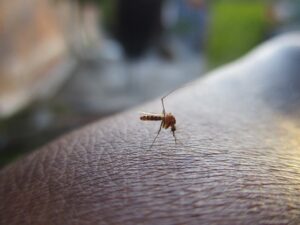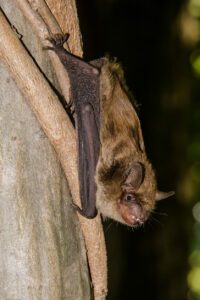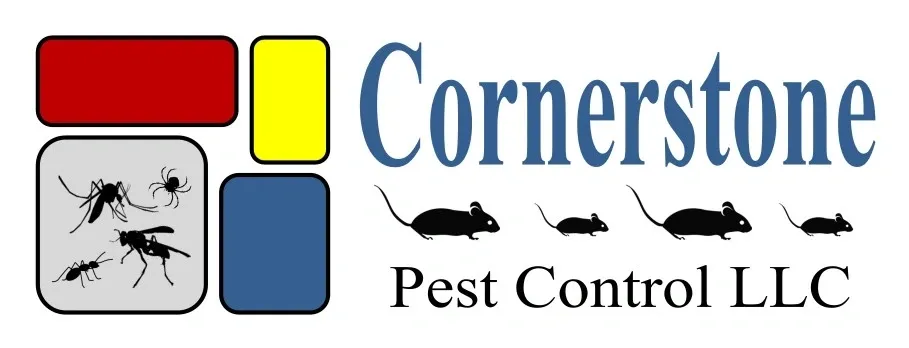When most people think of bats, they picture spooky caves or unwanted houseguests flapping through the attic. But bats in New England are more than just a Halloween symbol or a nuisance—they’re critical members of our local ecosystem. At Cornerstone Pest Control, we believe in educating homeowners on the importance of bats, their habits, and the legal requirements for handling bat removal the right way.
Why Bats Are Important
 Bats are some of the most efficient insect predators in nature. A single bat can eat hundreds of mosquitoes and other flying pests in just one hour, helping control insect populations and reduce the spread of diseases. In agricultural regions, bats also help protect crops by eating moths and beetles that damage produce. Their role as natural pest controllers makes them an important part of our environment and a benefit to both public health and the local economy.
Bats are some of the most efficient insect predators in nature. A single bat can eat hundreds of mosquitoes and other flying pests in just one hour, helping control insect populations and reduce the spread of diseases. In agricultural regions, bats also help protect crops by eating moths and beetles that damage produce. Their role as natural pest controllers makes them an important part of our environment and a benefit to both public health and the local economy.
In fact, the U.S. Geological Survey estimates that bats provide billions of dollars in pest control services to North American agriculture each year. Without them, insect populations would explode—causing more problems for farmers, homeowners, and ecosystems alike.
Bat Behavior and Habits in New England
New England is home to several bat species, including the Big Brown Bat and the Little Brown Bat. These species are insectivores and are typically active from April through October. As temperatures drop, they seek out warm, protected places to hibernate—and sometimes, that includes your attic, barn, or wall voids.
During the spring and summer months, female bats gather in maternity colonies to give birth and raise their young. This is one of the most sensitive times in the bat lifecycle, as baby bats (called pups) are born flightless and rely entirely on their mothers for survival.
Bats are nocturnal, roosting during the day and hunting insects by night using echolocation. If you’ve noticed increased bat activity around dusk, particularly near water sources or wooded areas, that’s because they’re heading out for their nightly hunt.
Bats in New England: Essential, Protected, and Seasonal Guests
 Bats are a protected species in both New Hampshire and Massachusetts, and for good reason. Many bat populations have been severely impacted by habitat loss and White-Nose Syndrome, a fungal disease that has decimated colonies across the Northeast.
Bats are a protected species in both New Hampshire and Massachusetts, and for good reason. Many bat populations have been severely impacted by habitat loss and White-Nose Syndrome, a fungal disease that has decimated colonies across the Northeast.
Because of their vulnerable status, both states have strict regulations around when and how bat removal (also known as “bat exclusion”) can be performed. These laws are designed to ensure that no harm comes to bats—especially during maternity season when young bats are unable to fly.
In both NH and MA, bat exclusion is only allowed during specific windows of time when young bats are old enough to leave the roost. Typically, this exclusion window opens in mid to late August and closes in early fall. Outside of this timeframe, exclusion is prohibited to prevent the risk of separating pups from their mothers, which would ultimately lead to the young bats dying inside structures.
What is Bat Exclusion?
Bat exclusion is a humane process of sealing a structure so bats can no longer enter, while giving them a one-way exit. This is typically done using specially designed bat cones or netting that allow bats to leave but not re-enter. Once the bats have left and it’s confirmed that the colony has vacated, all entry points are sealed permanently to prevent re-infestation.
Bat exclusion is not a DIY project—it requires expert knowledge, proper timing, and safe handling. At Cornerstone, we follow all state guidelines to ensure that exclusion is performed legally, humanely, and effectively.
Planning Ahead: The Best Time to Schedule
Because the legal window for exclusion is short—and demand is high—it’s essential to schedule an inspection well in advance. If you suspect bats may be in your home, the best time to call is now so we can assess your property and plan for exclusion as soon as the legal window opens.
Homeowners often wait until late summer to reach out, only to find that schedules are already full or that it’s too late to act. By getting on the schedule early, you’ll ensure your home is bat-free before winter—and you’ll be helping protect this vital species in the process.
Call Cornerstone for Responsible Bat Control
At Cornerstone Pest Control, we understand that bats can be unsettling houseguests—but they’re also essential to our ecosystem and legally protected. Our team is trained in safe, effective, and humane bat exclusion services that comply with all state laws in New Hampshire and Massachusetts.
If you suspect bat activity in your home, don’t wait. Contact us today at (603) 395-9200 to schedule an inspection and get on the list for the next legal exclusion period. Let’s work together to protect your home—and the bats that help protect our environment. For additional pest control articles, check out our blog!
